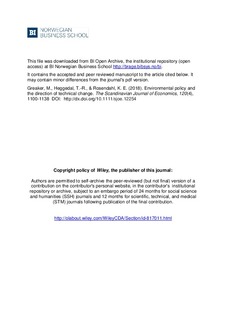| dc.contributor.author | Greaker, Mads | |
| dc.contributor.author | Heggedal, Tom-Reiel | |
| dc.contributor.author | Rosendahl, Knut Einar | |
| dc.date.accessioned | 2018-10-08T10:24:42Z | |
| dc.date.available | 2018-10-08T10:24:42Z | |
| dc.date.created | 2017-06-01T12:59:27Z | |
| dc.date.issued | 2018 | |
| dc.identifier.citation | The Scandinavian Journal of Economics, 2018, 120(4), 1100-1138 | nb_NO |
| dc.identifier.issn | 0347-0520 | |
| dc.identifier.issn | 1467-9442 | |
| dc.identifier.uri | http://hdl.handle.net/11250/2566820 | |
| dc.description.abstract | Should governments direct R&D from "dirty" into "clean" technologies? How im-portant is this compared to carbon pricing? We inquire into this, introducing twonovelties compared to recent literature. We introduce decreasing returns to R&D, andallow future carbon taxes to in‡uence current R&D decisions. Our results suggest thatgovernments should prioritize clean R&D. Dealing with major environmental problemsrequires R&D to shift to clean technology. However, with most researchers workingwith clean technology, both productivity spillovers and future risks of being replacedincrease. Consequently, the wedge between private and social value of an innovation islargest for clean technologies. | nb_NO |
| dc.language.iso | eng | nb_NO |
| dc.publisher | Wiley | nb_NO |
| dc.title | Environmental Policy and the Direction of Technical Change | nb_NO |
| dc.type | Journal article | nb_NO |
| dc.type | Peer reviewed | nb_NO |
| dc.description.version | acceptedVersion | nb_NO |
| dc.source.pagenumber | 1100-1138 | nb_NO |
| dc.source.volume | 120 | nb_NO |
| dc.source.journal | The Scandinavian Journal of Economics | nb_NO |
| dc.source.issue | 4 | nb_NO |
| dc.identifier.doi | 10.1111/sjoe.12254 | |
| dc.identifier.cristin | 1473488 | |
| dc.relation.project | Norges forskningsråd: 209698 | nb_NO |
| dc.description.localcode | 2, Forfatterversjon | nb_NO |
| cristin.unitcode | 158,3,0,0 | |
| cristin.unitname | Institutt for samfunnsøkonomi | |
| cristin.ispublished | true | |
| cristin.fulltext | postprint | |
| cristin.qualitycode | 2 | |
